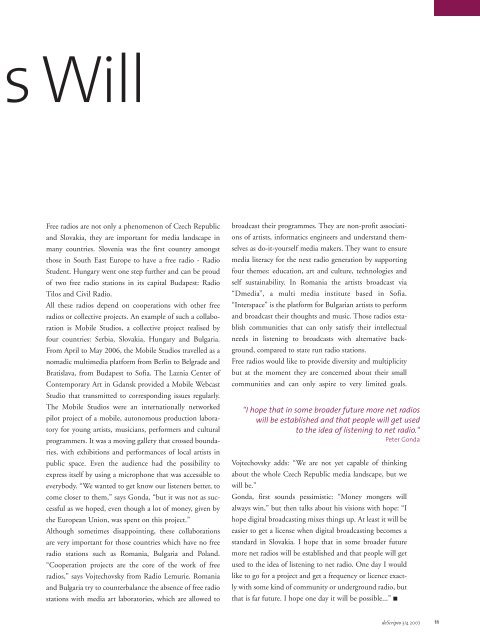DOSSIER
DOSSIER
DOSSIER
Create successful ePaper yourself
Turn your PDF publications into a flip-book with our unique Google optimized e-Paper software.
s Will<br />
Free radios are not only a phenomenon of Czech Republic<br />
and Slovakia, they are important for media landscape in<br />
many countries. Slovenia was the first country amongst<br />
those in South East Europe to have a free radio - Radio<br />
Student. Hungary went one step further and can be proud<br />
of two free radio stations in its capital Budapest: Radio<br />
Tilos and Civil Radio.<br />
All these radios depend on cooperations with other free<br />
radios or collective projects. An example of such a collaboration<br />
is Mobile Studios, a collective project realised by<br />
four countries: Serbia, Slovakia, Hungary and Bulgaria.<br />
From April to May 2006, the Mobile Studios travelled as a<br />
nomadic multimedia platform from Berlin to Belgrade and<br />
Bratislava, from Budapest to Sofia. The Laznia Center of<br />
Contemporary Art in Gdansk provided a Mobile Webcast<br />
Studio that transmitted to corresponding issues regularly.<br />
The Mobile Studios were an internationally networked<br />
pilot project of a mobile, autonomous production laboratory<br />
for young artists, musicians, performers and cultural<br />
programmers. It was a moving gallery that crossed boundaries,<br />
with exhibitions and performances of local artists in<br />
public space. Even the audience had the possibility to<br />
express itself by using a microphone that was accessible to<br />
everybody. “We wanted to get know our listeners better, to<br />
come closer to them,” says Gonda, “but it was not as successful<br />
as we hoped, even though a lot of money, given by<br />
the European Union, was spent on this project.”<br />
Although sometimes disappointing, these collaborations<br />
are very important for those countries which have no free<br />
radio stations such as Romania, Bulgaria and Poland.<br />
“Cooperation projects are the core of the work of free<br />
radios,” says Vojtechovsky from Radio Lemurie. Romania<br />
and Bulgaria try to counterbalance the absence of free radio<br />
stations with media art laboratories, which are allowed to<br />
broadcast their programmes. They are non-profit associations<br />
of artists, informatics engineers and understand themselves<br />
as do-it-yourself media makers. They want to ensure<br />
media literacy for the next radio generation by supporting<br />
four themes: education, art and culture, technologies and<br />
self sustainability. In Romania the artists broadcast via<br />
“Dmedia”, a multi media institute based in Sofia.<br />
“Interspace” is the platform for Bulgarian artists to perform<br />
and broadcast their thoughts and music. Those radios establish<br />
communities that can only satisfy their intellectual<br />
needs in listening to broadcasts with alternative background,<br />
compared to state run radio stations.<br />
Free radios would like to provide diversity and multiplicity<br />
but at the moment they are concerned about their small<br />
communities and can only aspire to very limited goals.<br />
“I hope that in some broader future more net radios<br />
will be established and that people will get used<br />
to the idea of listening to net radio.“<br />
Peter Gonda<br />
Vojtechovsky adds: “We are not yet capable of thinking<br />
about the whole Czech Republic media landscape, but we<br />
will be.”<br />
Gonda, first sounds pessimistic: “Money mongers will<br />
always win,” but then talks about his visions with hope: “I<br />
hope digital broadcasting mixes things up. At least it will be<br />
easier to get a license when digital broadcasting becomes a<br />
standard in Slovakia. I hope that in some broader future<br />
more net radios will be established and that people will get<br />
used to the idea of listening to net radio. One day I would<br />
like to go for a project and get a frequency or licence exactly<br />
with some kind of community or underground radio, but<br />
that is far future. I hope one day it will be possible...” ■<br />
deScripto 3/4 2007<br />
11

















